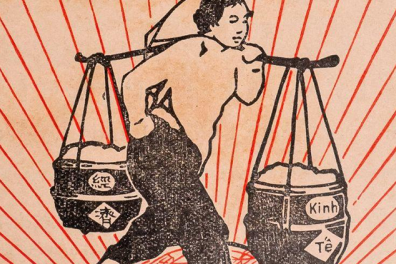Study day "Books and the written word in the modernization of Vietnam from the mid-19th century to the 1940s", April 19
The exhibition "Le Quốc-ngữ: L'écriture romanisée, vecteur d'une renaissance culturelle au Vietnam (1860-1945)" presented at BULAC will accompany this study day, which is also part of the 50th anniversary of France-Vietnam relations.

Event co-organized by the Bibliothèque universitaire des Langues et Civilisations (BULAC), the Centre de recherches linguistiques sur l'Asie orientale - CRLAO (Inalco-CNRS-EHESS), the Groupe Sociétés Religions Laïcités - GSRL (CNRS-EPHE), the Institut d'Asie Orientale - IAO (CNRS-ENS de Lyon) and the Institut de recherches asiatiques - IRASIA (CNRS-Aix Marseille Université).
Wednesday, April 19, 2023 - 09:00-17:30 - Maison de la recherche - Auditorium Dumézil
Inalco - 2, rue de Lille - 75007 Paris
Free admission subject to availability.
The exhibition "Le Quốc-ngữ: L'écriture romanisée, vecteur d'une renaissance culturelle au Vietnam (1860-1945)" presented at BULAC will accompany this study day, which is also part of the 50th anniversary of France-Vietnam relations.
Argumentary
In the troubled context of colonization, Vietnam is the only Asian country to have abandoned the official use of sinograms in favor of a new script based on Latin characters. This script, called quốc-ngữ, is the result of collaboration since the 17th century between European missionaries and early Vietnamese Christian scholars to facilitate evangelization. During the 19th century, the development of movable type printing at the expense of xylography definitively produced a mutation in the production of the written word.
From the day after the military conquest of Cochinchina, the establishment of colonial rule promoted the use of romanized Vietnamese for administrative and political reasons. The development of this new way of writing the Vietnamese language led to major cultural transformations. The replacement of the sinogram by the quốc-ngữ was proposed right from the start of colonization in Cochinchina, before being endorsed by the last literary competition in Hué in 1919. Vietnamese editions in quốc-ngữ then flourished from the 1870s onwards, as evidenced by the very many transliterations and translations of ancient writings, the publishing of dictionaries, language manuals, narratives, etc. by the colonial administration, Christian literati and more broadly a new emerging elite.
At the beginning of the 20th century, the spread of romanized writing was paradoxically supported by Vietnamese modernist literati who saw in this romanization an opportunity to open up to the European intellectual heritage, to facilitate access to new knowledge that would serve to build a modern nation. Easy to read and write, the quốc-ngữ was adopted by the Vietnamese and its spread gave birth to the modern Vietnamese press and literature. Local editions had developed and books, carriers of knowledge, circulated widely and became one of the important agents of modernization, illustrating Franklin Roosevelt's reflection, "Books are the guiding light of civilization". This was a real turning point in Vietnam's history.
For decades, the subject of Vietnam's modernization has interested many researchers, but the technical, material and linguistic aspects of publishing in this process remain little studied. These issues will be addressed during this study day.
Contacts:
NGUYEN Thi Hai (View e-mail)
DAO Huy Linh (View e-mail)
Organizing Committee
Pascal BOURDEAUX (GSRL, EPHE)
Huy Linh DAO (CRLAO, CNRS-EHESS-INALCO)
François GUILLEMOT (IAO, CNRS - ENS)
Thi Hai NGUYEN (BULAC)
Phuong Ngoc NGUYEN (IRASIA, CNRS - AMU)